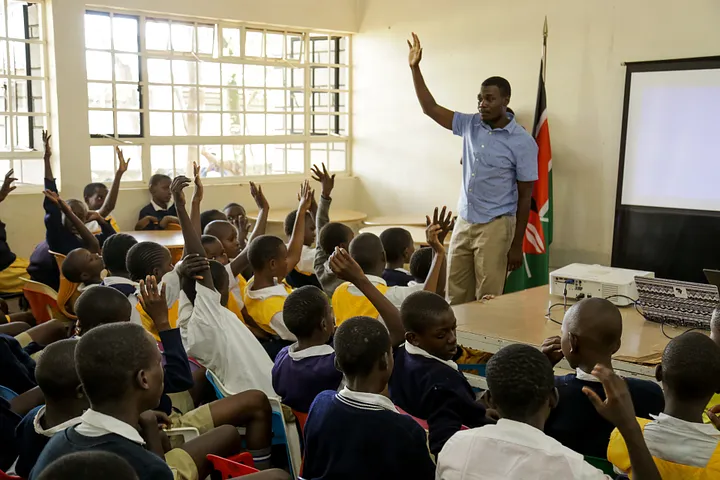
A lot has changed since Covid-19 was declared a global pandemic and for many of the entrepreneurs we support either as mentors or mentees, business models have had to be refined to adapt to the current needs of their clients, and in some cases totally shut down.
One of the tools we explore within our Kickstart workshops is the hero’s journey, a classic storytelling structure that explores an individual’s journey through uncertainty and change to eventual transformation. We believe that every single one of us undergoes a similar journey at various points in life, and during Covid times, many of us are experiencing this as we’re being forced to conform to a new set of rules around how we interact with each other and conduct business.
One entrepreneur who is embracing his hero’s journey during this period is Stephen Wanyingo, a Mowgli Mentor currently engaged in the Imarisha Programme in Kenya. The Kisumu based software engineer who runs Wezesha, a social enterprise that delivers coding accelerator programmes to schools and under-served communities, is now forced to make decisions on how to take his business forward.
Read all about how Stephen is managing his core business Wezesha, and exploring new ventures to supplement his income, create employment and feed his community.

“Growing up in Nyalenda slums in Kisumu, I had big dreams to excel in my education and study engineering. So when the opportunity came for me to join university, while I was grateful to be one of the very few pursuing a higher education in my neighbourhood, I wasn’t too thrilled about undertaking a Bachelors of Commerce degree. Getting into private university was not an option for me. I had no choice but enrol as a commerce student at the University of Nairobi. However as fate and interest would have it, I found myself spending more time in the School of Informatics where I met a lecturer who noticed my interest and encouraged me to follow my dream. He would later coach me into changing my major to engineering – a childhood dream come true! Later in life, I came to the realisation that he was not only a lecturer and friend, but one of the most prominent mentors I’ve had in my life.”
The journey to Wezesha…
“After completing my university education, I had a period of employment as a software developer where I would work during the day, and develop software for private clients during the night. I soon realised that my side hustle made me more money than my day job. I had also been thinking of ways to give back to the community that raised me and this made my dream clearer, that I not only needed to get into entrepreneurship but start my business in Kisumu where I could expose people in under-served communities to the opportunities and knowledge I had been exposed to.”

Meaning enable in Swahili, Wezesha is a software development organisation that delivers coding accelerator programmes enabling underprivileged, yet talented youth to become high impact software developers and tech leaders. The organisation focuses on:
Skill and talent development, teaching coding, software development, robotics and data science
Opportunity & talent matching
Software consulting
“At the moment, majority of our clients are schools that contract us to teach coding skills to their students. However, due to the government’s directive to close down learning institutions, we’re not able to deliver these programmes at the moment. It’s an interesting period because we’re now forced to rethink how we conduct our training, bearing in mind that our students come from poor backgrounds where technology is a luxury.”
As Stephen explores how to change his business model to support his students and meet the emerging online world’s needs, he’s also working with local partners to set-up hand washing stations and create awareness on the importance of following government directives on social distancing.

Coping with Covid-19 restrictions and exploring new opportunities
“It’s not been easy, but I feel like I am finding myself. I’m developing new skills and interests, and spending more time in the farm where I keep goats and sheep. Looking back at how life was before this pandemic, I realise that I was always in a rush chasing something new everyday. This period has brought some form of structure, and I’m able to see things from a different point of view including how I run my business and the things I value.”
“For the first time in my life, I have gotten into baking. I started a bakery business from my home using an oven that had been untouched since it was purchased years ago. Through this bakery, I’ve created a source of income for my wife and a friend; and inline with my personal values, I’m able to sell at a much lower price ensuring my community can afford their daily bread. I currently sell a loaf at only Ksh. 30, almost half the average price of bread in this country. We already have more demand than supply.
Majority of what we consume in Kisumu is produced outside the county. We’ve seen a decline in supply of basic goods including bread making this new venture quite exciting for me.”
“Hunger is what people are most afraid of during this period yet we have the skills to produce food affordably in Kisumu.”
“This is a whole new revenue stream and I am already thinking of ways to scale up. My plan is to move part of my operations from home and set up a shop in the city centre to reach more people.”
The only thing we’re certain about is that this period calls for change — whether or not we’re ready for it. We, therefore, hope that stories such as Stephen’s inspire you and provide some form of encouragement if you are uncertain about starting that business that’s been lingering in your thoughts for the longest time, or re-look at your business model.